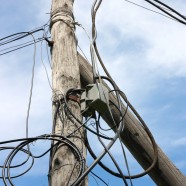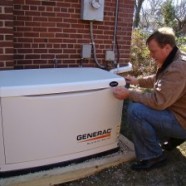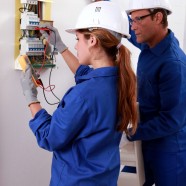4 Types of Electrical Motor Protection Functions
Electrical motors are designed to work within a designated range of electrical power rates. Add too much power or too little, and the motor can be damaged or broken beyond repair. This is a special concern for Florida residents and business people, since electrical surges and power outages are common occurrence, no matter what the season of year. The electrical protection of motors can be achieved by installing any number of devices and systems, each of which is designed to protect a certain type of circuit, machine, or building.
Read MoreWhy You Need a Generator Maintenance Agreement
Between hurricanes, lightning strikes and tropical storms, power outages are always a worry in south Florida. Losing power is a concern for almost everyone in the area, but it can be a greater problem for some than for others. If you own a business or need electrical power for medical equipment, keeping the power on is crucial for your well-being. Installing a backup generator is the smart thing to do, but you can’t just put it in and forget about it until the next storm. Generator maintenance is something that has to be done on a regular basis if you want your power to stay on in an emergency.
What is Generator Maintenance?
Like a car or any other complicated piece of machinery, generators need servicing every now and again. Without this care metal might be worn or rusted, fuel can leak or get fouled, and the generator might not work when it’s most needed.
Among the tasks needed on a regular basis are:
- Cleaning the air filter
- Changing the oil
- Changing the spark plugs
- Sweeping off the outside intake vents
- Topping off fuel tanks
Finding a Contractor
The electrical contractor who installed your backup generator will probably be able to offer you a generator maintenance agreement. He’s the best choice to work with, because he’ll be intimately familiar with your particular generator brand and the way it was installed in your building. If your contractor doesn’t offer maintenance agreements, ask trusted friends for recommendations. Older companies may be a better choice, simply because a multi-year maintenance agreement counts on the reliability of the contractor. The bottom line is finding someone you trust to come back season after season.
If you’ve recently renovated your home or business, or you’re in the process of planning and creating a new building, your electrical contractor will probably offer you an electrical service contract. This includes monitoring all the electrical equipment in the building, from wiring to lighting. You can add generator maintenance to the service contract. It will be a simple matter for the contractor to check and maintain one more piece of equipment if he’s in your home or business, anyway.
Advantages of a Maintenance Agreement
You’ve got a busy life and, if you’re like most people, you have to prioritize the things in your life that take up your time. Backup generator maintenance may not even be on your weekly radar, much less high on the list of jobs you need to get done. If it’s not done on a regular, timely schedule, though, the odds are that one day, when you need it most, your power is going to go off and the generator won’t come on to replace it. A contractor who comes out once or twice a year makes sure your generator is in great shape and ready for any outage that might happen. You won’t have to remember to do it, and it won’t take hours out of your busy afternoons.
If you have medical issues that require a constant source of electricity or if you run a business in south Florida, having a generator maintenance agreement can pay for itself after one blackout. The peace of mind you’ll have knowing a professional has maintained your machine can be more valuable than the cost of any contract.
Read More5 Benefits of an Electrical Maintenance Agreement
Unexpected repair bills can hurt your bottom line at the absolute worst time. Maintaining your equipment before it breaks down is the best way to avoid costly repairs, but maintenance tasks can take valuable time out of already-tight schedules. The best way to deal with this problem is to have an electrical maintenance agreement with a commercial electrician. A professional electrician in south Florida will know what systems need to be monitored more closely because of the environment you’re in, and he will create a plan with you to ensure all your major systems stay in good working order. An electrical maintenance agreement is like insurance for your electrical system, and can pay off in a number of ways.
Cost Containment Strategy
Everything you can do to nail down your costs for the year is another step toward keeping your bottom line in the black. Emergencies happen with any business, but caring for your equipment on a regular business will reduce the chances of an electrical emergency to an absolute minimum. Whether it’s tiny expenses like replacing blown out light bulbs or major repairs like a broken backup generator, it’s still money in the bank that you won’t have to spend. Not only will you have peace of mind knowing your system is more reliable, you’ll free up cash you might otherwise have to save and earmark toward future unexpected repair bills. Use this extra cash to pay down your debt, invest in better equipment, or simply grow the profits in your business.
Improves Employee Productivity
In south Florida the quality of life depends on serious and dependable air conditioning units. There may be no other system that affects your workers more than the A/C in the building. During some weeks of the year, the heat and humidity may be too high for your usual business day to proceed. If you’re in the restaurant business, or have a shop that depends on customers coming in and browsing, rooms nearing 100 degrees are simply too hot to deal with. Even with factories or other industries, heat and humidity will impact your workers. Heat will cause people to slow down and increase absenteeism among the workforce.
Reduce Energy Costs
Air conditioning units with clogged filters, lights with incandescent bulbs and broken, inefficient machinery all add up to increased energy costs. Every one of these circumstances is one that’s usually taken care of during visits laid out in an electrical maintenance agreement. It’s simple for any electrician in south Florida to take care of these problems before they happen. The money you save on the FPL bill can more than cover the costs of your regular maintenance contract.
Can Pay for Itself
Maintenance agreements come with a monthly bills, but they can pay for themselves by avoiding costly experiences from expensive equipment breaking down:
- Increased repair costs from after-hours repair bills
- Loss of productivity from broken equipment
- Employees calling off or slowing down from an overheated environment
- The cost of replacing broken equipment
Protects Expensive Equipment
Whether you’ve got a conveyor oven, a walk-in freezer, or a manufacturing setup, your business equipment is the heart of your company. Avoiding regular maintenance is just asking to have a piece of equipment break down before its natural life is over. Each piece of equipment comes with a service manual that lays out recommended maintenance tasks and a schedule on which to base the upkeep. Discuss this schedule with your electrician in south Florida to tie it in with the rest of his electrical maintenance agreement.
Read MoreHow to Prevent Problems from Overloaded Circuits
It’s not likely that your house will catch on fire from one tripped circuit breaker, but frequently overloaded electrical circuits can become a dangerous situation if they’re not corrected. Power surges are common in Florida because of the frequent electrical storms in the area, and any circuit that’s running up to capacity is in danger of overloading every time lightning strikes in the area. Preventing problems with your electrical equipment is a matter of preparing ahead of time, then keeping up with the quality of your equipment rather than letting it fall into disrepair.
Audit Your Equipment
If you’ve been tripping circuit breakers or if you have lights that dim when the refrigerator comes on, you know where the problems are in your house. Not having these problems doesn’t mean your electrical equipment is perfectly fine, though. Circuits may be running just on the edge of their limits, and one storm or an extra appliance being plugged in can be just enough to push them over the edge.
If you don’t have a circuit map of your home, take the time to create one of your own. Turn one breaker off, then move through the house and see what lights, outlets, and equipment doesn’t work. Mark that area on the map and indicate what breaker it’s connected to, then move on to another breaker. Map out your entire house in this manner.
Go through each individual circuit and unplug any appliances that aren’t currently in use. If you make coffee once a day, unplug the pot when you’re ready to head out in the morning. Work all day long? You don’t need the television plugged in, draining power while you’re gone. From phone chargers to blow dryers, most houses have dozens of items plugged in and draining power. Lighten the load on your circuits by unplugging yours.
Upgrade Your Electrical Installation
The equipment in your house uses electrical services in the most efficient way it can, but if you’re overloading the system, it’s probably time to upgrade and replace your older electrical equipment. The most obvious clue that you need an upgrade is having an older house with a fuse box instead of circuit breakers. Call an electrical contractor to replace this immediately, as older fuse boxes are almost invariably worn out, creating a fire hazard in your home.
If you’re constantly having to unplug appliances just to plug something else in, or if you’re relying on power strips and extension cords as a permanent solution, you need an upgrade on wiring and outlets. Adding outlets in logical places depending on your electrical usage can help to spread the load, but you may need additional upgraded wiring if your usage is heavy in one part of the house such as an office with multiple computers and large monitors. Your contractor will test your lines and tell you if you need an upgrade.
Schedule Regular Maintenance Appointments
Electrical maintenance isn’t just for repairing problems once they’ve happened. The best and least expensive way to deal with electrical problems is to prevent them before they happen. Scheduling regular maintenance appointments with an electrical contractor will eliminate most of the problems you have with wiring and circuits in your home. An electrical contractor will check wiring for wear and excess usage, look for possible improvements in your system, suggest ways to save power, and replace any equipment that’s beginning to wear out. You schedule regular dental and medical checkups for yourself; give your home the same consideration and have your electrical contractor check your wiring a couple times a year.
Read More6 Top Tips for Standby Generator Maintenance
Power outages can range from 2-minute inconveniences to blackouts that last multiple days. The shorter ones can be slightly annoying, but longer blackouts can affect your business or your quality of life. The best way to avoid shutting your business down or suffering through bad weather due to a blackout is to install a standby generator to supplement your basic electrical system. Like any other piece of electrical machinery, generators need to be maintained on a regular basis to keep them in good working order. If you want your standby generator to be reliable in a blackout, you have to be reliable in the care you give it the rest of the year.
Tip #1: Read the Owner’s Manual
Every generator has a slightly different set of procedures for its regular maintenance schedule. Before trying any form of mechanical work on your standby generator, read the manual to find the model-specific advise it offers.
Tip #2: Conduct a Visual Inspection
Whether you have a built-in generator or a portable model, you should visually inspect it on a regular basis. Look for leaves and other plant debris that may have blown into the body that may clog operations. Try spotting puddles of oil and coolant to make sure leaks haven’t developed. Make sure the exhaust port is open and free of clogs.
Tip #3: Change the Oil Regularly
You probably wouldn’t drive your car for a year without changing the oil. The same thing applies to the motor in your standby generator. The oil inside has to be changed on a regular basis, especially after being used for any length of time. After a lengthy period of use, allow the generator to cool down for at least 48 hours. Check the oil to see if it needs changing.
If the oil needs changing, empty out the old oil and replace it with 2 quarts of new. You can use natural oil or synthetic, but synthetic oil works better in extreme cold and higher heat, so it may be a better choice. While you’re changing the oil, change out the old, dirty oil filter and replace it with a fresh one.
Tip #4: Pull the Spark Plugs
Spark plugs can get dirty and corroded in a generator, even with light use. Pull the plugs in yours after one year and compare them to a set of new ones. You’ll probably find that the old set is covered in brown and black corrosion. Replace all the spark plugs with a new set, then mark your calendar to remind yourself to do the same thing next year.
Tip #5: Replace the Air Filter
You know how dirty the air filter gets in a car or your home furnace. Accumulated dust and dirt will eventually clog the air passages, preventing fresh air to move through. Depending on the air quality in your environment, you may have to replace the air filter in your standby generator twice a year or every two years. It’s a simple procedure – just open the cover, slip out the old filter and slide in a new one.
Tip #6: Run the Engine
Start and run your standby generator every month. Let it run until the temperature stays the same for at least 10 minutes. This will allow the oil to circulate throughout the engine, lubricating the parts, and will ensure that no leaks or cracks in the exhaust are beginning to form.
At the absolute minimum, standby generator maintenance is something you should do at least once every two years, or after 200 hours of constant use. Never using the generator is not an excuse for leaving it alone for years at a time. Doing that will almost guarantee that it will fail you when you need it most.
Read MoreElectrical Wiring: Working With an Experienced Professional
Whether you’re renovating a small business or building an entire subdivision, you may be tempted to hire a general contractor to take care of your electrical needs. A contractor may claim to be less expensive than a licensed electrician, but his lack of knowledge and experience with the small details of electrical work can end up costing you in the long run. An experienced licensed electrician can do the correct electrical wiring job for your building project, economically and safely.
Planning
Restaurant retrofits have different wiring requirements than community centers, but only an experienced professional can know all the details needed for each job. An experienced professional electrician will sit down with you in the early planning stages of a project, blending the electrical wiring plans with all other aspects of construction. He knows about specialized wiring plans, depending on the type of business you will be building. Whether you need extra outlets for kitchen equipment or an area with specialized task lighting for an office, you’ll get a job that fits your need better by using someone with experience.
Cost Savings
The cheapest way to go is not always the most cost-effective method when hiring contractors for your commercial building or renovation project. An experienced licensed electrician can save you money in a number of ways when hired instead of a general contractor. While contractors will have some electrical experience as a result of doing a variety of work, a licensed electrician knows all the small details that make up a efficient and complete electrical wiring job.
- Experienced electricians make fewer mistakes, requiring less reworking on a project
- Years of experience means knowledge of multiple methods of doing a job, including the most cost-effective one for you
- Licensed contractors often have relationships with suppliers, and can get raw materials for the job cheaper
- Contractors with experience know the best way to install an electrical wiring job, cutting down on time and money
Ideas
A general contractor may be perfectly competent to follow your directions and install exactly what you are asking for, but an experienced licensed electrician will know enough about the subject that he can offer suggestions that improve on what you’ve already done. Instead of simply being an employee, an experienced electrician can be a partner in your project, showing you improved ways to install electrical wiring and offering suggestions about outlets, lighting, safety, and security. Specialization creates expertise, and experience gives a professional the experiences to find multiple options for your project.
Legality
Each community has its own building codes, for electricity and electrical wiring as well as for structure. Hiring a licensed professional electrician will ensure you work with someone who knows building codes and has worked within them for years. You’ll avoid work stoppages that come from having to redo sections to bring them up to code, and you’ll sail through city inspections once your project is nearing completion.
Read More






Recent Comments